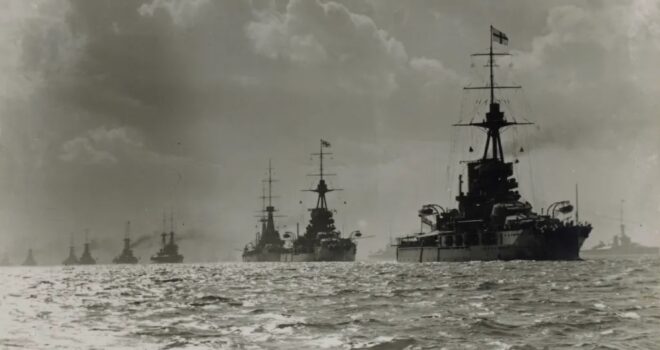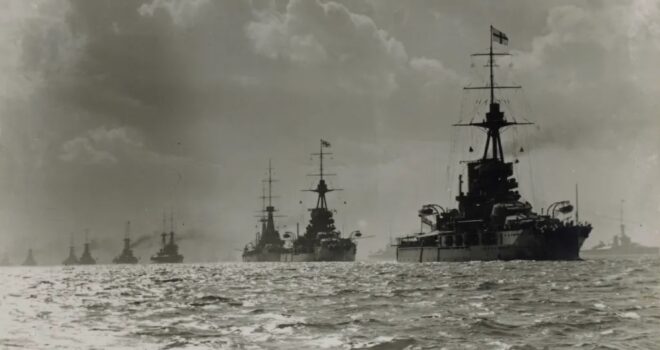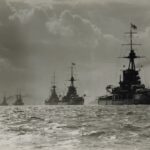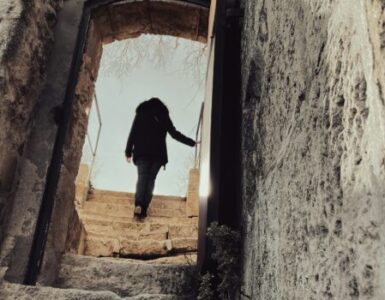Great Britain entered the first World War one hundred and nine years ago today: August 4, 1914. Pivotal events in history can easily become lines of text and dates in history books. We forget their reality. I have often reflected upon the enduring influence of the two World Wars: their memory is much fresher in Europe, although even there the last who lived through them as children are now very old. Those two conflicts–both of them “wars to end all wars”–never touched America in the same way. The action was tidily out of site, on foreign shores. Thus it is easy to forget that history was real, and that we are living in what will one day be history. When we study history, we must not forget that it concerned individuals, their dignity, their faces, their thoughts and fingernails and yawns.
The great friend of Chesterton, Hilaire Belloc, remembers the start of World War I in his delightful and melancholy book The Cruise of the Nona. Sailing in his boat near England in July 1914, there came to him “an experience of no particular moment as history,” but which had a “powerful effect” upon his mind. “It marked, in a sort of mysterious omen way, or, perhaps, I should say in a sort of visionary way, the unleashing of the Great War.”
Belloc knew the times were unsettled:
I knew that the times were perilous, but I knew no more than any other man, in that odd week’s lull before the storm, exactly how perilous they were. It was nearly a month, I think, since I had heard the priest read out, from those altar steps of Salisbury, prayers for the Archduke who had been murdered at Sarajevo…When I had set out from Plymouth there was nothing but rumour, nothing certain. The Fleet had dispersed already some days past from the great review at Spithead, and was, as we were told, in the Atlantic at manoeuvres. A night, a day, and now another night had passed; I had heard no news.
I was living in Ireland when hostilities broke out in the Ukraine. Closeness to the scene of action always changes one’s perceptions. In America, it seems that hostilities are always vaguely “on the other side of the world,” whether in Ukraine, Afghanistan, Africa, or Taiwan. But in Ireland the bombs were only “over the horizon,” a little under 1,500 miles away—the distance from San Francisco to Dallas. We must remember that history can touch us, even as it touched Belloc in the early morning as he sailed in the Nona.
“Nothing was further from my mind than war and armament as the sun rose on that glorious July morning, right out of a clean horizon, towards which the wind blew fresh and cool,” Belloc writes. This one man’s memory of the great war is precious in its particularity. It reminds us that the Great War—which caused about 20 million deaths—is and was more than numbers on a textbook page.
In the morning haze a line of ships appears and Belloc, sailing quietly, notes: “Then I knew that war would come, and my mind was changed.” This was his “vision”:
The sun rose, as I have said. Immediately after its rising a sort of light haze filled the air to eastward. It was denser than it seemed to be, for it did not obscure the low disc of the sun, nor redden it, but, as you will read in a moment, it performed a mystery. The little ship slipped on….There was no sail in sight. I was alone upon the sea; and the breeze, neither freshening nor lowering, but giving a hearty line of course (along which we slipped, perhaps, five knots or six), made the water speak merrily upon the bows and along the run of our low sides. In this loneliness and content, as I sailed northward, I chanced to look, after an hour’s steering or so, eastward again towards the open sea—and then it was that there passed me the vision I shall remember forever, or for so long as the longest life may last.
Like ghosts, like things themselves made of mist, there passed between me and the newly risen sun a procession of great forms, all in line, hastening eastward. It was the Fleet recalled.
The British fleet had been maneuvering at sea, but with the advent of war was recalled. “[T]his marvel was of short duration. It was seen for a moment, and in a moment it was gone.” At that moment the rest of the war was still in the future, of course. “What that war would bring, its magnitude, its character, was veiled from us all; but the advent of it, the mass of it coming, put a new face on everything I saw and felt and heard; on the steady breeze, on the little lapping of the salt sea-water, on the strong headlands of England.”
We seldom know if we have seen the tip of an historical iceberg. Belloc knew. Some of us thought Ukraine would escalate more quickly than it has. Its future is still veiled, but it can serve as a reminder to meditate on the history which, for Belloc, was present experience.
Americans never walked into their backyard to look up and see a dogfight between German and Allied pilots the way British women and children did; never saw the trail of smoke as one of their nation’s sons or enemies plummeted to his death in a neighboring field. “War followed,” Belloc says, “with what full fruits only men now young can live to discover.” One of the fruits, the most bitter of all, was World War II. Belloc lost a son in both world wars: and the young men who would discover its fruits are now long dead. We who are alive today are the ones who must continue, whether we will or no, to reap history’s fruits and to make our mark upon it for our children. We prepare fruits and we reap them; over the preparation we have some control, if not over the reaping. I’m sure these words of Gandalf would have resonated with Belloc, even though they were published more than a decade after his death:
It is not our part to master all the tides of the world, but to do what is in us for the succour of those years wherein we are set, uprooting the evil in the fields that we know, so that those who live after may have clean earth to till. What weather they shall have is not ours to rule. (Return of the King, Ch. 9)
Reading a book like The Cruise of the Nona helps us to step back from our own times and gain a wider and deeper perspective. If we take up his book, we will find ourselves transported to that and many other moments which record history differently than textbooks: as real moments in the life of one man. The great moments and movements of history involve and concern individual men and women. Belloc’s cruise, the morning mist, and the line of warships steaming back to England were one among the million moments which made up the start of World War I.












